Surveillance and interference: Israel’s covert war on the ICC exposed
Top Israeli government and security officials have overseen a nine-year surveillance operation targeting the ICC and Palestinian rights groups to try to thwart a war crimes probe, a joint investigation reveals.
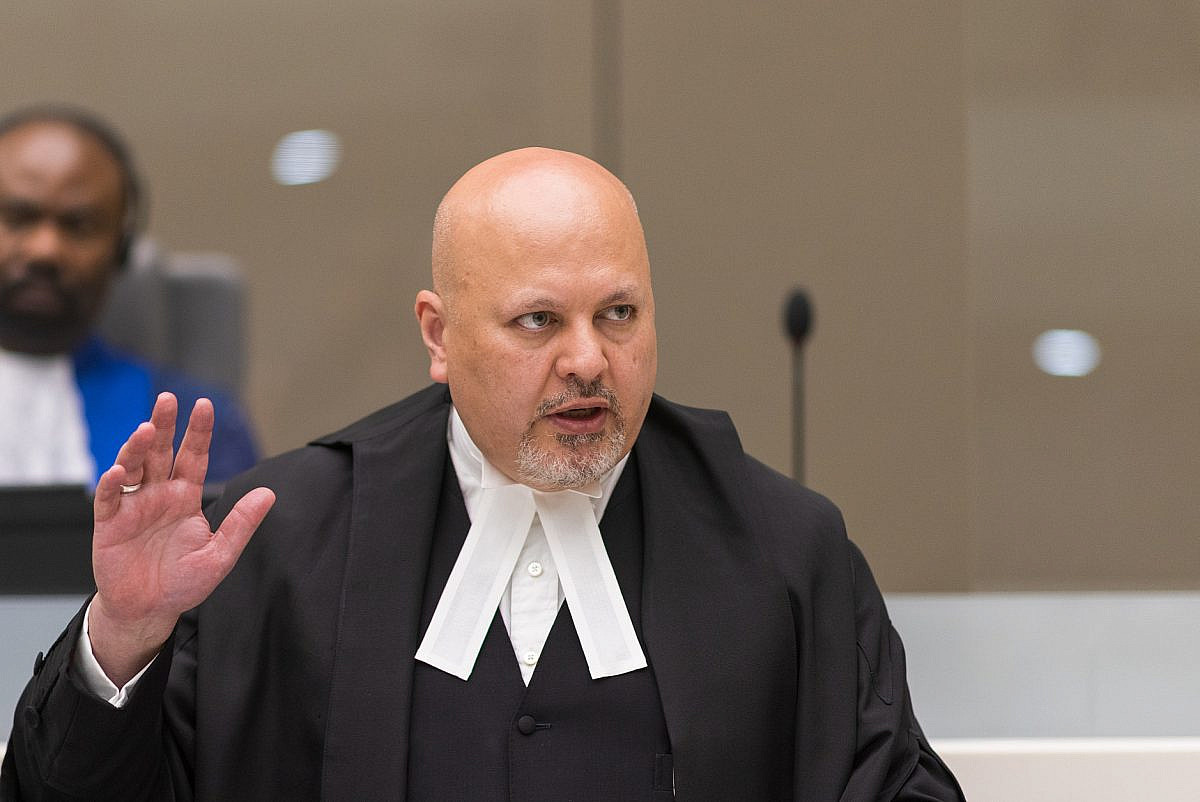
For nearly a decade, Israel has been surveilling senior International Criminal Court officials and Palestinian human rights workers as part of a secret operation to thwart the ICC’s probe into alleged war crimes, a joint investigation by +972 Magazine, Local Call, and the Guardian can reveal.
The multi-agency operation, which dates back to 2015, has seen Israel’s intelligence community routinely surveil the court’s current chief prosecutor Karim Khan, his predecessor Fatou Bensouda, and dozens of other ICC and UN officials. Israeli intelligence also monitored materials that the Palestinian Authority submitted to the prosecutor’s office, and surveilled employees at four Palestinian human rights organizations whose submissions are central to the probe.
According to sources, the covert operation mobilized the highest branches of Israel’s government, the intelligence community, and both the civilian and military legal systems in order to derail the probe.
The intelligence information obtained via surveillance was passed on to a secret team of top Israeli government lawyers and diplomats, who traveled to The Hague for confidential meetings with ICC officials in an attempt to “feed [the chief prosecutor] information that would make her doubt the basis of her right to be dealing with this question.” The intelligence was also used by the Israeli military to retroactively open investigations into incidents that were of interest to the ICC, to try to prove that Israel’s legal system is capable of holding its own to account.
Additionally, as the Guardian reported earlier today, the Mossad, Israel’s foreign intelligence agency, ran its own parallel operation which sought out compromising information on Bensouda and her close family members in an apparent attempt to sabotage the ICC’s investigation. The agency’s former head, Yossi Cohen, personally attempted to “enlist” Bensouda and manipulate her into complying with Israel’s wishes, according to sources familiar with his activities, causing the then-prosecutor to fear for her personal safety.
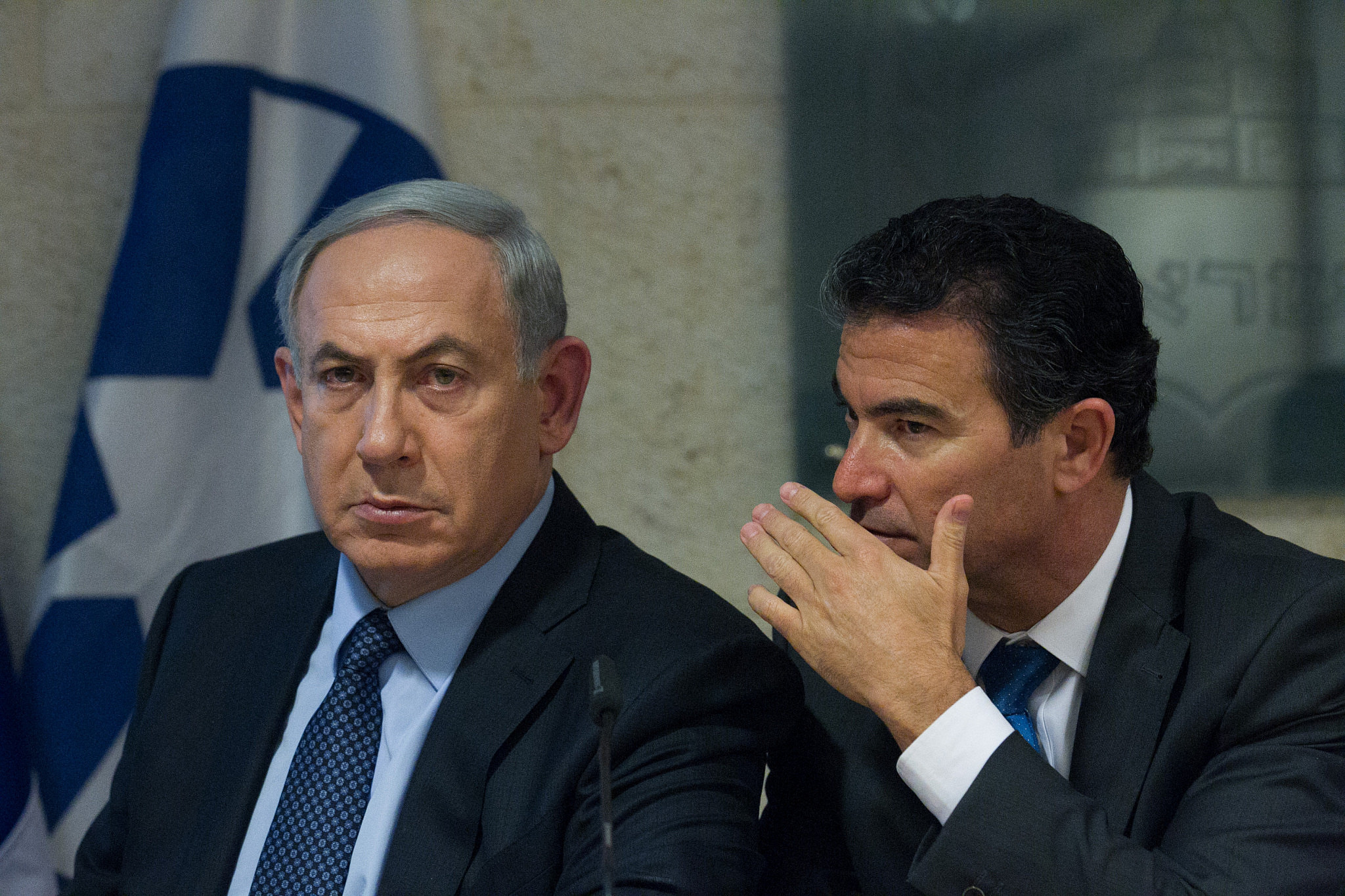
Prime Minister Benjamin Netanyahu, seen with Yossi Cohen, then-head of the national security council, at a press conference at the Foreign Ministry in Jerusalem, October 15, 2015. (Miriam Alster/Flash90)
Our investigation draws on interviews with more than two dozen current and former Israeli intelligence officers and government officials, ex-ICC officials, diplomats, and lawyers familiar with the ICC case and Israel’s efforts to undermine it. According to these sources, initially, the Israeli operation attempted to prevent the court from opening a full criminal investigation; after a full probe was set in motion in 2021, Israel sought to ensure that it would come to nothing.
Moreover, according to several sources, Israel’s underhanded efforts to interfere with the investigation — which could amount to offenses against the administration of justice, punishable by a prison sentence — have been managed from the very top. Prime Minister Benjamin Netanyahu is said to have taken a keen interest in the operation, even sending intelligence teams “instructions” and “areas of interest” regarding their monitoring of ICC officials. One source stressed that Netanyahu was “obsessed, obsessed, obsessed” with finding out what materials the ICC was receiving.
The prime minister had good reason to be concerned: last week, Khan announced that his office is seeking arrest warrants for Netanyahu and Defense Minister Yoav Gallant, as well as three leaders in Hamas’ political and military wings, in relation to alleged war crimes and crimes against humanity committed on or since October 7. The announcement made clear that additional warrants — which expose prosecuted individuals to arrest should they visit any of the ICC’s 124 member states — may yet be pursued.
For Israel’s top brass, Khan’s announcement was no surprise. In recent months, the surveillance campaign targeting the chief prosecutor “climbed to the top of the agenda,” according to one source, thus giving the government advance knowledge of his intentions.
Tellingly, Khan issued a cryptic warning in his remarks: “I insist that all attempts to impede, intimidate, or improperly influence the officials of this court must cease immediately.” Now, we can reveal details of part of what he was warning against: Israel’s nine-year “war” on the ICC.
‘The generals had a big personal interest in the operation’
Unlike the International Court of Justice (ICJ), which deals with the legality of states’ actions — and which last week issued a ruling seen as calling on Israel to halt its offensive in Gaza’s southernmost city of Rafah, in the context of South Africa’s petition accusing Israel of committing genocide in the Strip — the ICC deals with specific individuals suspected of having committed war crimes.
Israel has long held that the ICC has no jurisdiction to prosecute Israeli leaders because, like the United States, Russia, and China, Israel is not a signatory to the Rome Statute which established the court, and Palestine is not a full UN member state. But Palestine was nevertheless recognized as an ICC member upon signing the convention in 2015, having been admitted to the UN General Assembly as a non-member observer state three years prior.
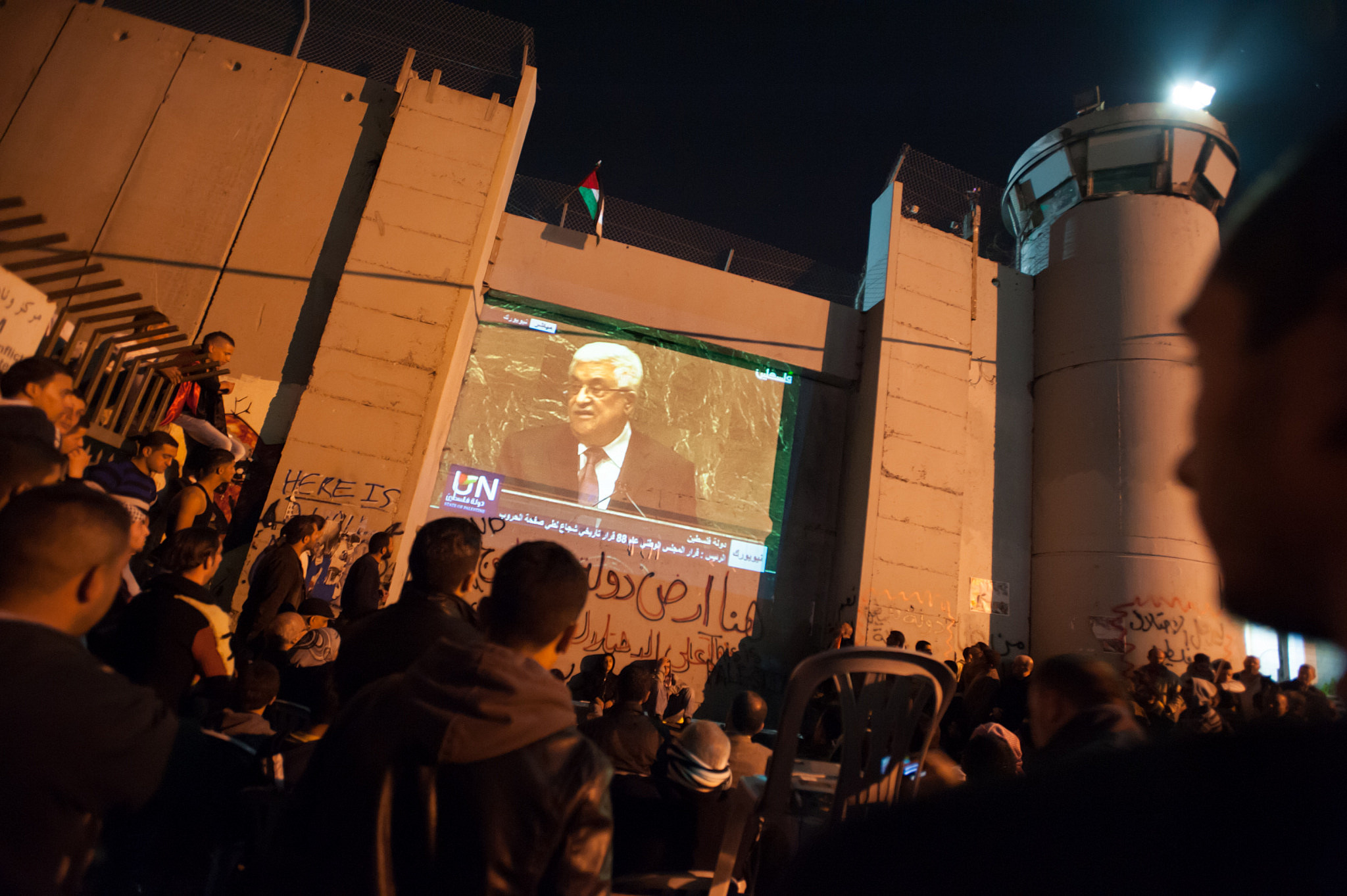
Palestinians gather to watch the speech by President Mahmoud Abbas in the bid for Palestine’s “non-member observer state” status at the United Nations, projected on the Israeli separation wall in the West Bank town of Bethlehem, November 29, 2012. (Ryan Rodrick Beiler/Activestills)
Palestine’s entry into the ICC was condemned by Israeli leaders as a form of “diplomatic terrorism.” “It was perceived as the crossing of a red line, and perhaps the most aggressive thing the Palestinian Authority has ever done to Israel in the international arena,” an Israeli official explained. “To be recognized as a state in the UN is nice, but the ICC is a mechanism with teeth.”
Immediately after becoming a member of the court, the PA asked the prosecutor’s office to investigate crimes committed in the Gaza Strip and the West Bank, including East Jerusalem, starting from the date on which the State of Palestine accepted the court’s jurisdiction: July 13, 2014. Fatou Bensouda, the chief prosecutor at the time, opened a preliminary examination to determine whether the criteria for a full investigation could be met.
Fearing the legal and political consequences of potential prosecutions, Israel raced to prepare intelligence teams in the army, the Shin Bet (domestic intelligence), and the Mossad (foreign intelligence), alongside a covert team of military and civilian lawyers, to lead the effort to forestall a full ICC investigation. All this was coordinated under Israel’s National Security Council (NSC), whose authority is derived from the Prime Minister’s Office.
“Everyone, the entire military and political establishment, was looking for ways to damage the PA’s case,” said one intelligence source. “Everyone pitched in: the Justice Ministry, the Military International Law Department [part of the Military Advocate General’s Office], the Shin Bet, the NSC. [Everyone] saw the ICC as something very important, as a war that had to be waged, and one that Israel had to be defended against. It was described in military terms.”
The military was not an obvious candidate for joining the Shin Bet’s intelligence-gathering efforts, but it had a strong motivation: preventing its commanders from being forced to stand trial. “The ones who really wanted to [join the effort] were the IDF generals themselves — they had a very big personal interest,” one source explained. “We were told that senior officers are afraid to accept positions in the West Bank because they are afraid of being prosecuted in The Hague,” another recalled.
According to numerous sources, Israel’s Ministry of Strategic Affairs, whose stated goal at the time was to fight against the “delegitimization” of Israel, was involved in the surveilling of Palestinian human rights organizations that were submitting reports to the ICC. Gilad Erdan, head of the ministry at the time and now Israel’s representative to the UN, recently described the ICC’s pursuit of arrest warrants for Israeli leaders as “a witch-hunt driven by pure Jew-hatred.”
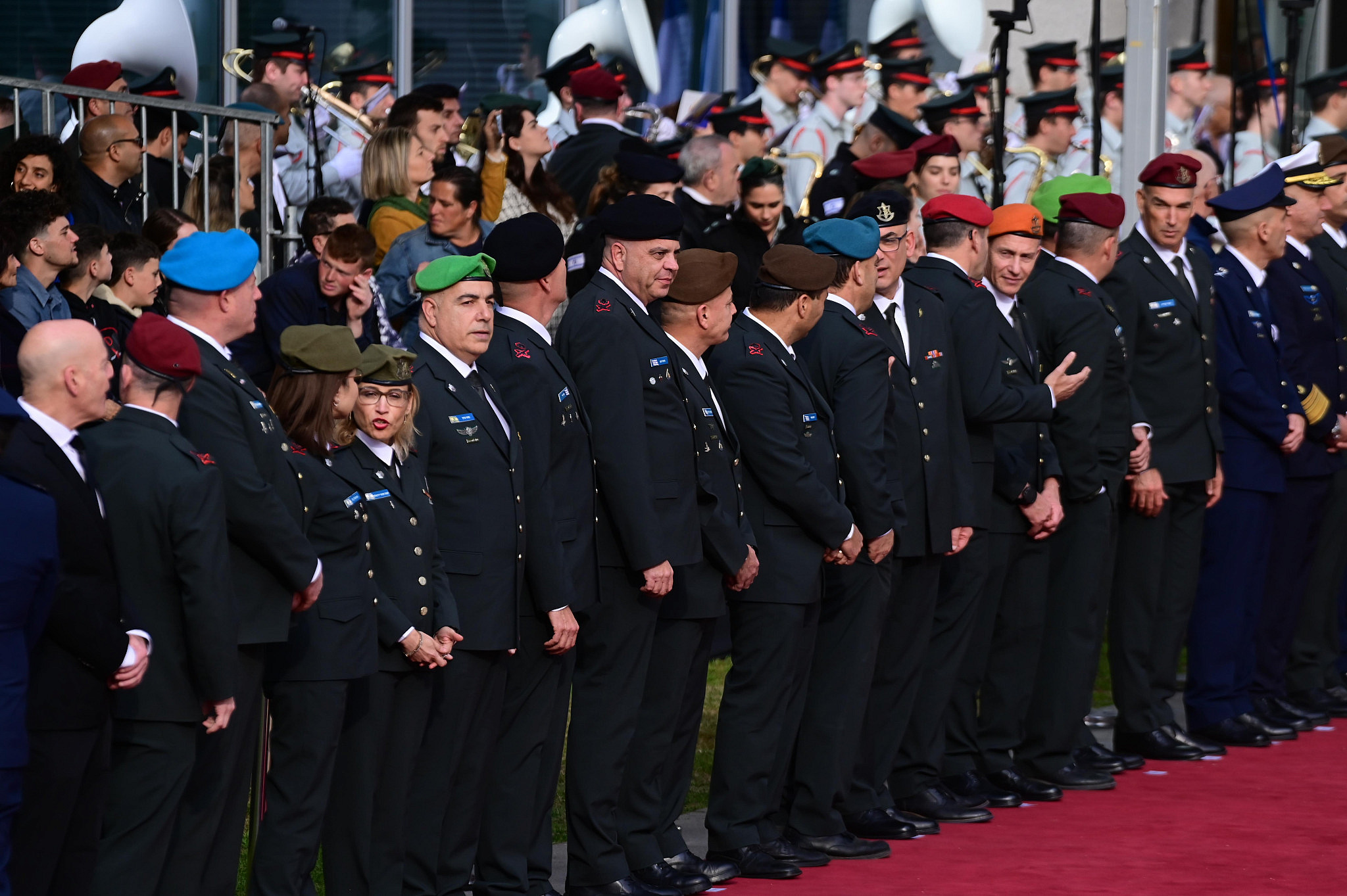
A ceremony for incoming Chief of Staff, Herzi Halevi at HaKirya base in Tel Aviv, January 16, 2023. (Tomer Neuberg/Flash90)
‘The army dealt with things that were completely non-military’
Israel’s covert war on the ICC has relied centrally on surveillance, and the chief prosecutors have been prime targets.
Four sources confirmed Bensouda’s private exchanges with Palestinian officials about the PA’s case in The Hague were routinely monitored and shared widely within Israel’s intelligence community. “The conversations were usually about the progress of the prosecution: submitting documents, testimonies, or talking about an event that happened — ‘Did you see how Israel massacred Palestinians at the last demonstration?’ — things like that,” one source explained.
The former prosecutor was far from the only target. Dozens of other international officials related to the probe were similarly surveilled. One of the sources said there was a large whiteboard with the names of around 60 people who were under surveillance — half of them Palestinians and half from other countries, including UN officials and ICC personnel in The Hague.
Another source recalled surveillance on the person who wrote the ICC’s report on Israel’s 2014 Gaza war. A third source said Israeli intelligence monitored a UN Human Rights Council commission of inquiry into the occupied territories, in order to identify what materials it was receiving from the Palestinians, “because the findings of commissions of inquiry of this kind are usually used by the ICC.”
In The Hague, Bensouda and her senior staff were alerted by security advisers and via diplomatic channels that Israel was monitoring their work. Care was taken not to discuss certain matters in the vicinity of phones. “We were made aware they were trying to get information on where we were with the preliminary examination,” a former senior ICC official said.
According to sources, some in the Israeli army found it controversial that military intelligence was dealing with matters that were political and not directly related to security threats. “IDF resources were used to surveil Fatou Bensouda — this isn’t something legitimate to do as military intelligence,” one source stated. “This task [was] really unusual in the sense that it was inside the army, but dealt with things that were completely non-military,” said another source.
But others had fewer hesitations. “Bensouda was very, very one-sided,” one source who surveilled the former prosecutor claimed. “She was really a personal friend of the Palestinians. Public prosecutors don’t usually behave that way. They stay very distant.”
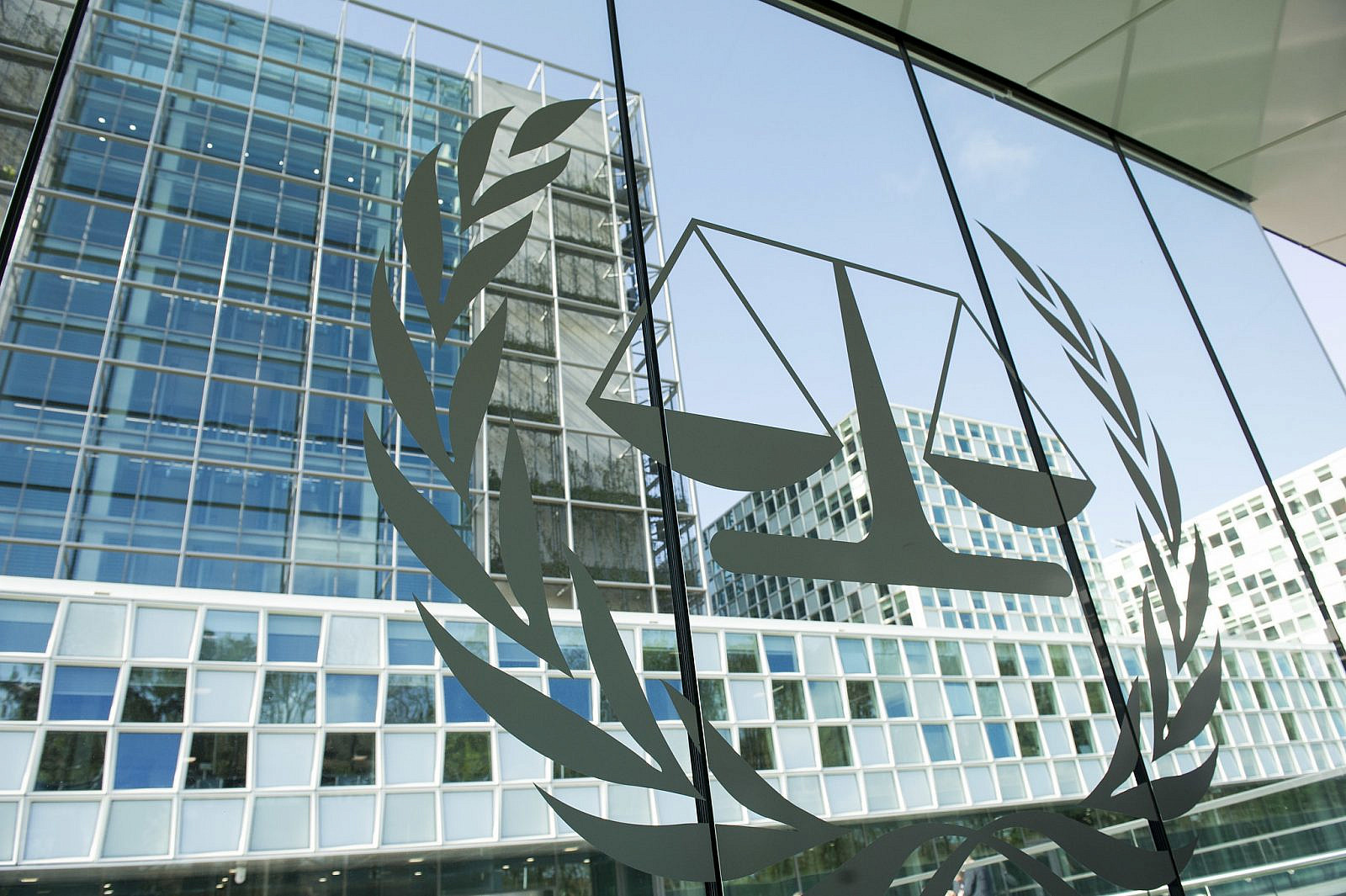
Official Opening of the Permanent Premises of the International Criminal Court, April 19, 2016. (UN Photo/Rick Bajornas)
‘If you don’t want me to use the law, what do you want me to use?’
Because Palestinian human rights groups were frequently providing the prosecutor’s office with materials about Israel’s attacks on Palestinians, detailing incidents they wanted the prosecutor to consider as part of the probe, these organizations themselves became key targets of Israel’s surveillance operation. Here, the Shin Bet took the lead.
In addition to monitoring materials that the PA submitted to the ICC, Israeli intelligence also monitored appeals and reports from the human rights groups that included testimonies of Palestinians who had suffered attacks by Israeli settlers and soldiers; Israel then surveilled these testifiers, too.
“One of the [priorities] was to see who [in the human rights groups] is involved in collecting testimonies, and who were the specific people — the Palestinian victims — being convinced to give testimony to the ICC,” one intelligence source explained.
According to the sources, the primary surveillance targets were four Palestinian human rights organizations: Al-Haq, Addameer, Al Mezan, and the Palestinian Center for Human Rights (PCHR). Addameer sent appeals to the ICC about torture practices against prisoners and detainees, while the other three groups sent multiple appeals over the years regarding Israel’s settlement enterprise in the West Bank, punitive house demolitions, bombing campaigns in Gaza, and specific senior Israeli political and military leaders.
One intelligence source said the motive for surveilling the organizations was stated openly: they harm Israel’s standing in the international arena. “We were told that these are organizations that operate in the international arena, participate in BDS, and want to harm Israel legally, so they’re being monitored too,” the source said. “That’s why we’re engaging with this. Because it can hurt people in Israel — officers, politicians.”
Another goal of surveilling the Palestinian groups was to try to delegitimize them, and, by extension, the entire ICC investigation.
In October 2021, Israeli Defense Minister Benny Gantz — who himself was named in several of the appeals that Palestinian organizations sent to the ICC, due to his role as chief of staff during the 2014 Gaza war and defense minister during the May 2021 war — declared Al-Haq, Addameer, and four other Palestinian human rights groups to be “terrorist organizations.”
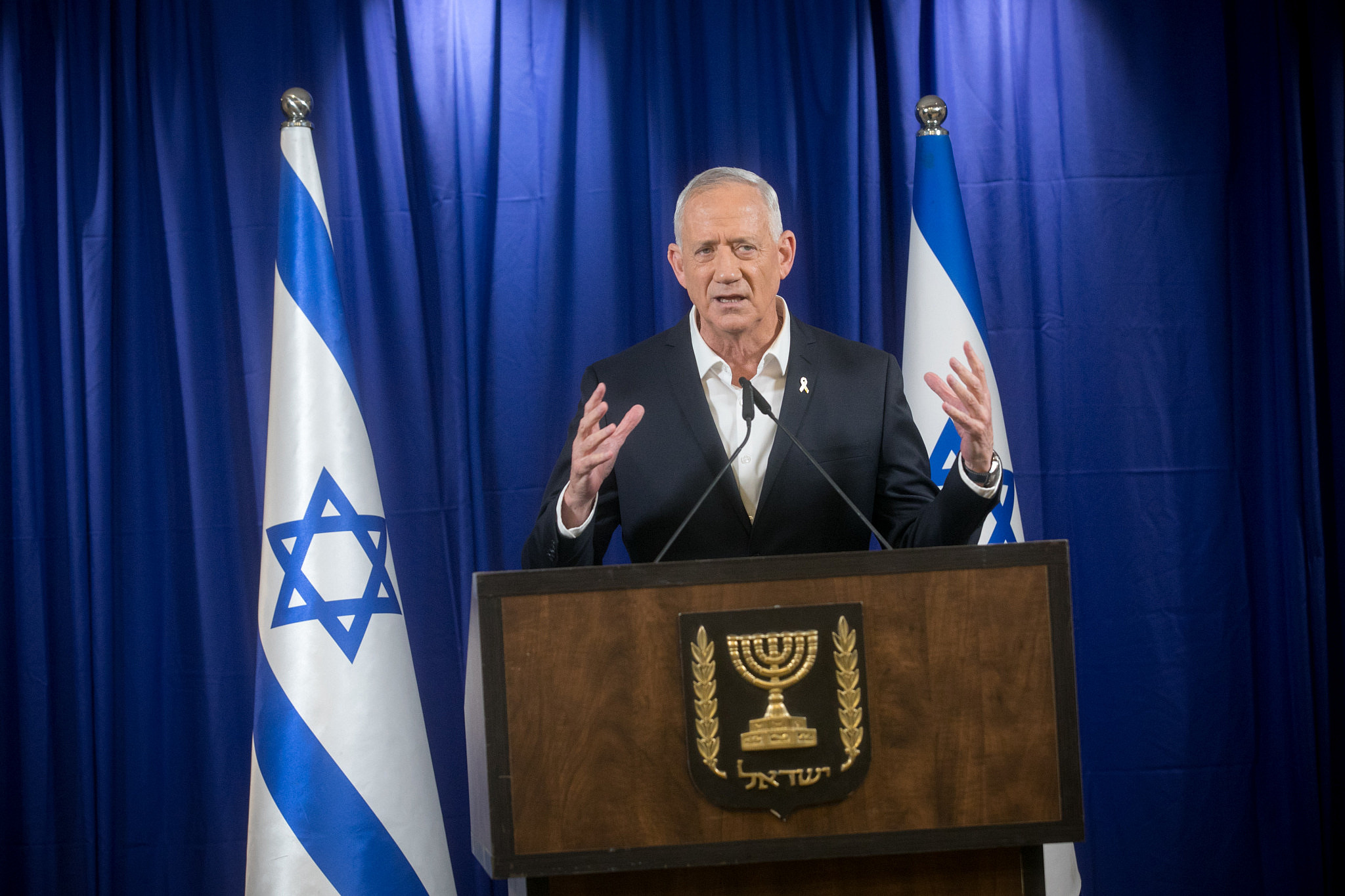
Benny Gantz, war cabinet minister and head of the National Unity Party, holds a press conference in Ramat Gan, May 18, 2024. (Miriam Alster/Flash90)
A +972 and Local Call investigation, released a few weeks later, found that Gantz’s order was issued without any serious evidence to back up its allegations; a Shin Bet dossier claiming to provide proof of its charges, and another follow-up dossier a few months later, left even Israel’s staunchest allies unconvinced. At the time, it was widely speculated — including by the organizations themselves — that these groups were targeted at least in part because of their activities relating to the ICC probe.
According to an intelligence source, the Shin Bet — which gave the initial recommendation to outlaw the six groups — surveilled the organizations’ employees, and the information gathered was used by Gantz when he declared them terrorist organizations. An investigation by Citizen Lab at the time identified Pegasus spyware, produced by the Israeli firm NSO Group, on the phones of several Palestinians working in those NGOs. (The Shin Bet did not respond to our request for comment.)
Omar Awadallah and Ammar Hijazi, who are in charge of the ICC case within the PA’s Foreign Affairs Ministry, also discovered that Pegasus had been installed on their phones. According to intelligence sources, the two were simultaneously targets of different Israeli intelligence organizations, which created “confusion.” “They’re both super impressive PhDs who deal with this subject all day, from morning to night — that’s why there was intelligence to be gained [from tracking them],” said one source.
Hijazi isn’t surprised that he was surveilled. “We don’t care if Israel sees the evidence we submitted to the court,” he said. “I invite them: Come, open your eyes, see what we presented.”
Shawan Jabarin, the director general of Al-Haq, was also surveilled by Israeli intelligence. He said there had been indications that the organization’s internal systems had been hacked, and that Gantz’s declaration came just days before Al-Haq planned to reveal that it had discovered Pegasus spyware on the phones of its employees. “They say I’m using the law as a weapon of war,” Jabarin said. “If you don’t want me to use the law, what do you want me to use, bombs?”
However, the human rights groups expressed deep concern for the privacy of the Palestinians who submitted testimonies to the court. One of the groups, for example, included only the initials of the testifiers in its submissions to the ICC, out of fear that Israel might identify them.
“People are afraid to file a complaint [to the ICC], or to mention their real names, because they fear being persecuted by the military, of losing their entry permits,” Hamdi Shakura, a lawyer at PCHR, explained. “A man in Gaza who has a relative sick with cancer is scared the army will take his entry permit and prevent his treatment — this sort of thing happens.”
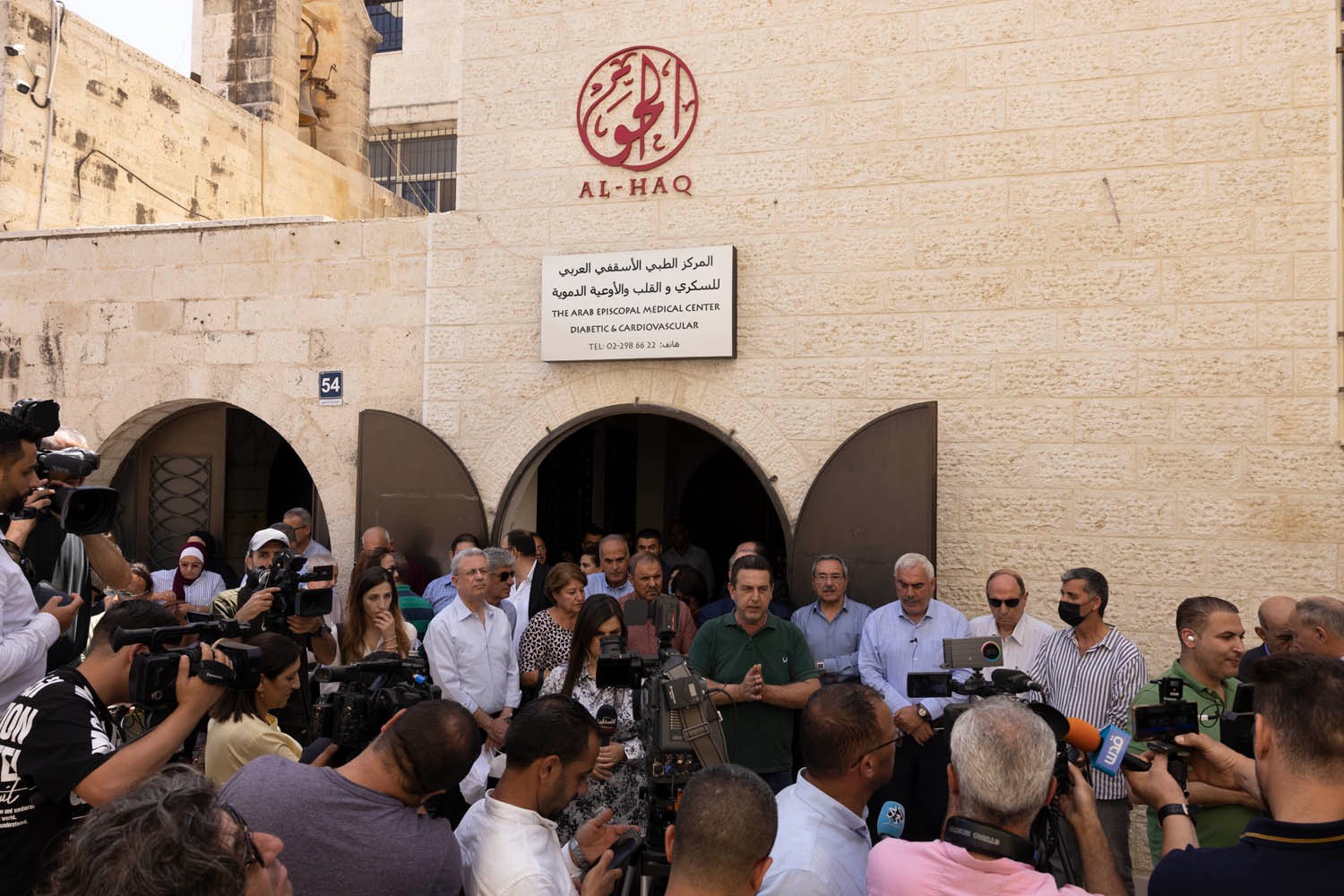
Heads of Palestinian NGOs speak to the media outside of Al-Haq’s offices after the Israeli army raided their offices, Ramallah, West Bank, August 18, 2022. (Oren Ziv)
‘The lawyers had a big thirst for intelligence’
According to intelligence sources, a further use of the intelligence obtained via surveillance was to help lawyers involved in secret back-channel conversations with representatives of the prosecutor’s office in The Hague.
Soon after Bensouda announced that her office was opening a preliminary examination, Netanyahu ordered the formation of a covert team of lawyers from the Justice Ministry, Foreign Ministry, and Military Advocate General’s Office (the Israeli army’s highest legal authority), which regularly traveled to The Hague for secret meetings with ICC officials between 2017 and 2019. (Israel’s Justice Ministry did not respond to requests for comment.)
Although the team was comprised of individuals who were not part of Israel’s intelligence community — it was led by Tal Becker, legal adviser to the Foreign Ministry — the Justice Ministry was nonetheless privy to the intelligence obtained via surveillance, and had access to reports from the PA and Palestinian NGOs detailing specific cases of settler and military violence.
“The lawyers who dealt with the issue at the Justice Ministry had a big thirst for intelligence,” one intelligence source stated. “They got it from both military intelligence and the Shin Bet. They were building the case for the Israeli messengers who secretly went and communicated with the ICC.”
In their private meetings with ICC officials, which were confirmed by six sources familiar with the meetings, the lawyers set out to prove that Israel had robust and effective procedures for holding soldiers to account, despite the Israeli military’s dire record of investigating alleged wrongdoing within its ranks. The lawyers also sought to make the case that the ICC has no jurisdiction to investigate Israel’s actions, since Israel is not a member state of the court and Palestine is not a fully-fledged member of the UN.
According to a former ICC official familiar with the contents of the meetings, ICC personnel presented the Israeli lawyers with details of incidents in which Palestinians were attacked or killed, and the lawyers would respond with their own information. “In the beginning it was tense,” recalled the official.
At this stage, Bensouda was still engaged in a preliminary examination prior to the decision to open a formal investigation. An intelligence source said that the purpose of the information obtained through surveillance was “to make Bensouda feel that her legal data is unreliable.”
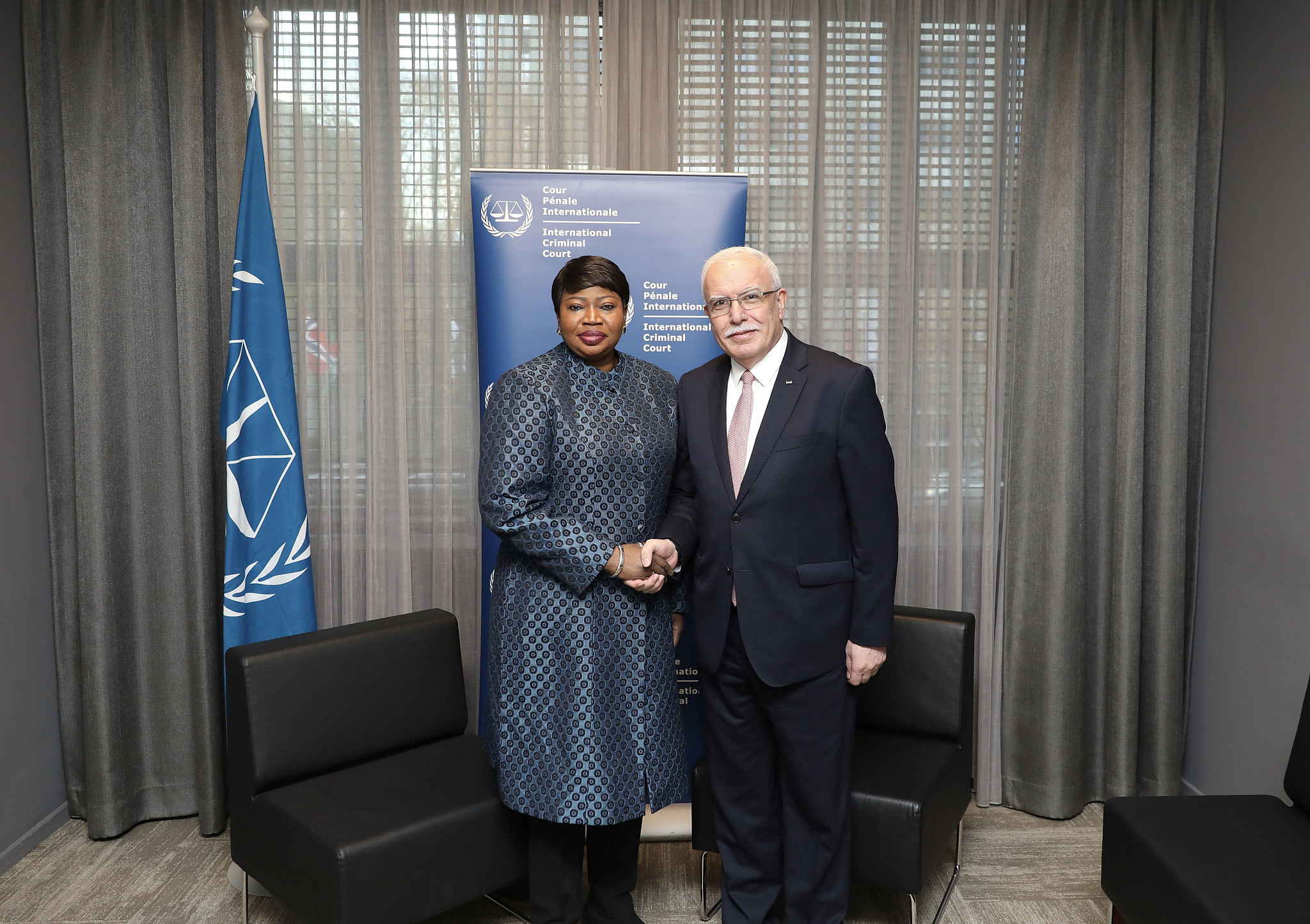
ICC Prosecutor Fatou Bensouda meets with Palestine’s Minister of Foreign Affairs Riyad al-Maliki on the margins of the 18th session of the ASP, December 2, 2019. (ICC-CPI)
According to the source, the goal was to “feed [Bensouda] information that would make her doubt the basis of her right to be dealing with this question. When Al-Haq collects information on how many Palestinians have been killed in the occupied territories in the past year and passes it on to Bensouda, it’s in Israel’s interest and policy to pass her counterintel, and to try to undermine this information.”
Given that Israel refuses to recognize the court’s authority and legitimacy, however, it was crucial for the delegation that these meetings be kept secret. A source familiar with the meetings said the Israeli officials repeatedly stressed to the ICC that “we can never make it public that we’re communicating with you.”
Israel’s backchannel meetings with the ICC ended in December 2019, when Bensouda’s five-year preliminary examination concluded that there was a reasonable basis to believe that both Israel and Hamas had committed war crimes. Rather than immediately launching a full investigation, however, the prosecutor asked the court’s judges to rule on whether it had jurisdiction to hear the allegations due to “unique and highly contested legal and factual issues” — which some viewed as a direct outcome of Israel’s activity.
“I wouldn’t say that the legal argument had no effect,” Roy Schondorf, a member of the Israeli delegation as the head of a Justice Ministry department responsible for handling international legal proceedings against Israel, said at an event at the Institute for National Security Studies in July 2022. “There are also people there who can be persuaded, and I think that to a considerable extent, the State of Israel managed to convince at least the previous prosecutor [Bensouda], that there would be enough doubt about the question of jurisdiction for her to turn to the judges of the court.”
‘The claim of complementarity was very, very significant’
In 2021, the court’s judges ruled that the ICC does have jurisdiction over all war crimes committed by Israelis and Palestinians in the occupied Palestinian territories, as well as crimes committed by Palestinians on Israeli territory. Despite six years of Israeli efforts to forestall it, Bensouda announced the opening of a formal criminal investigation.
But it was far from a foregone conclusion. A few months earlier, the prosecutor had decided to abandon an examination into British war crimes in Iraq because she was convinced that Britain had taken “genuine” action to investigate them. According to senior Israeli jurists, Israel clung to this precedent, and initiated a close collaboration between the intelligence-gathering operation and the military justice system.
According to the sources, a central goal of Israel’s surveillance operation was to enable the military to “open investigations retroactively” into cases of violence against Palestinians that reach the prosecutor’s office in The Hague. In doing so, Israel aimed to exploit the “principle of complementarity,” which asserts that a case is inadmissible before the ICC if it is already being thoroughly investigated by a state with jurisdiction over it.
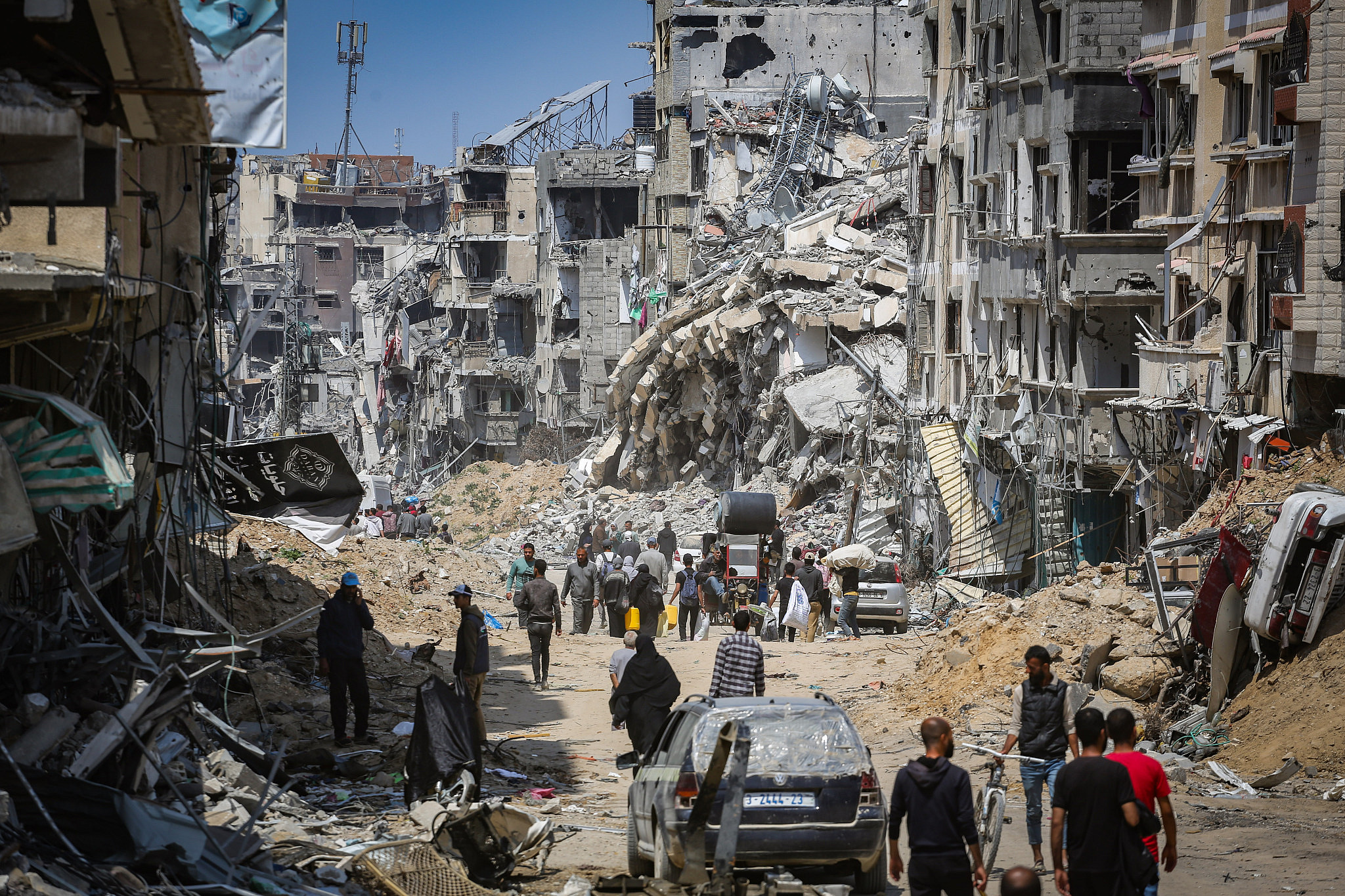
Palestinians return to inspect their homes in Khan Younis after the Israeli army withdrew from the area, southern Gaza Strip, April 8, 2024. (Atia Mohammed/Flash90)
“If materials were transferred to the ICC, it had to be understood exactly what they were, to ensure that the IDF investigated them independently and sufficiently so that they could claim complementarity,” one of the sources explained. “The claim of complementarity was very, very significant.”
Legal experts within the Joint Chief of Staff’s Fact-Finding Assessment Mechanism (FFAM) — the military body that investigates alleged war crimes by Israeli soldiers — were also privy to intelligence information, sources said.
Among the dozens of incidents currently under investigation by the FFAM are the bombings that killed dozens of Palestinians in the Jabaliya refugee camp last October; the “flour massacre” in which more than 110 Palestinians were killed in northern Gaza upon the arrival of an aid convoy in March; the drone strikes that killed seven World Central Kitchen employees in April; and an airstrike in a tent encampment in Rafah that ignited a fire and killed dozens last week.
For the Palestinian NGOs filing reports with the ICC, however, Israel’s internal military accountability mechanisms are a farce. Echoed by Israeli and international experts and human rights groups, Palestinians have long argued that these systems — from police and army investigators to the Supreme Court — routinely serve as a “fig leaf” for the Israeli state and its security apparatus, helping to “whitewash” crimes while effectively granting soldiers and commanders a license to continue criminal acts with impunity.
Issam Younis, who was a target of Israeli surveillance because of his role as director of Al Mezan, spent much of his career in Gaza, in the organization’s now partially bombed offices, collecting and filing “hundreds” of complaints from Palestinians to the Israeli Military Advocate General’s Office. The vast majority of these complaints were closed with no indictments, convincing him that “victims cannot pursue justice through that system.”
This is what led his organization to engage with the ICC. “In this war, the nature and scope of crimes committed are unprecedented,” said Younis, who escaped Gaza with his family in December, and is today a refugee in Cairo. “And it’s simply because accountability was not there.”
‘October 7 changed that reality’
In June 2021, Khan replaced Bensouda as chief prosecutor, and many in the Israeli judicial system hoped this would turn over a new leaf. Khan was perceived as more cautious than his predecessor, and there was speculation that he would choose not to prioritize the explosive investigation he inherited from Bensouda.
In an interview in September 2022, in which he also revealed some details about Israel’s “informal dialogue” with the ICC, Schondorf of Israel’s Justice Ministry praised Khan for having “shifted the trajectory of the ship,” adding that it seemed like the prosecutor would focus on more “mainstream issues” because the “Israeli-Palestinian conflict became a less pressing issue for the international community.”
Meanwhile, Khan’s personal judgment became the main research target of Israel’s surveillance operation: the goal was to “understand what Khan was thinking,” as one intelligence source put it. And while initially the prosecutor’s team does not appear to have shown much enthusiasm for the Palestine case, according to a senior Israeli official, “October 7 changed that reality.”
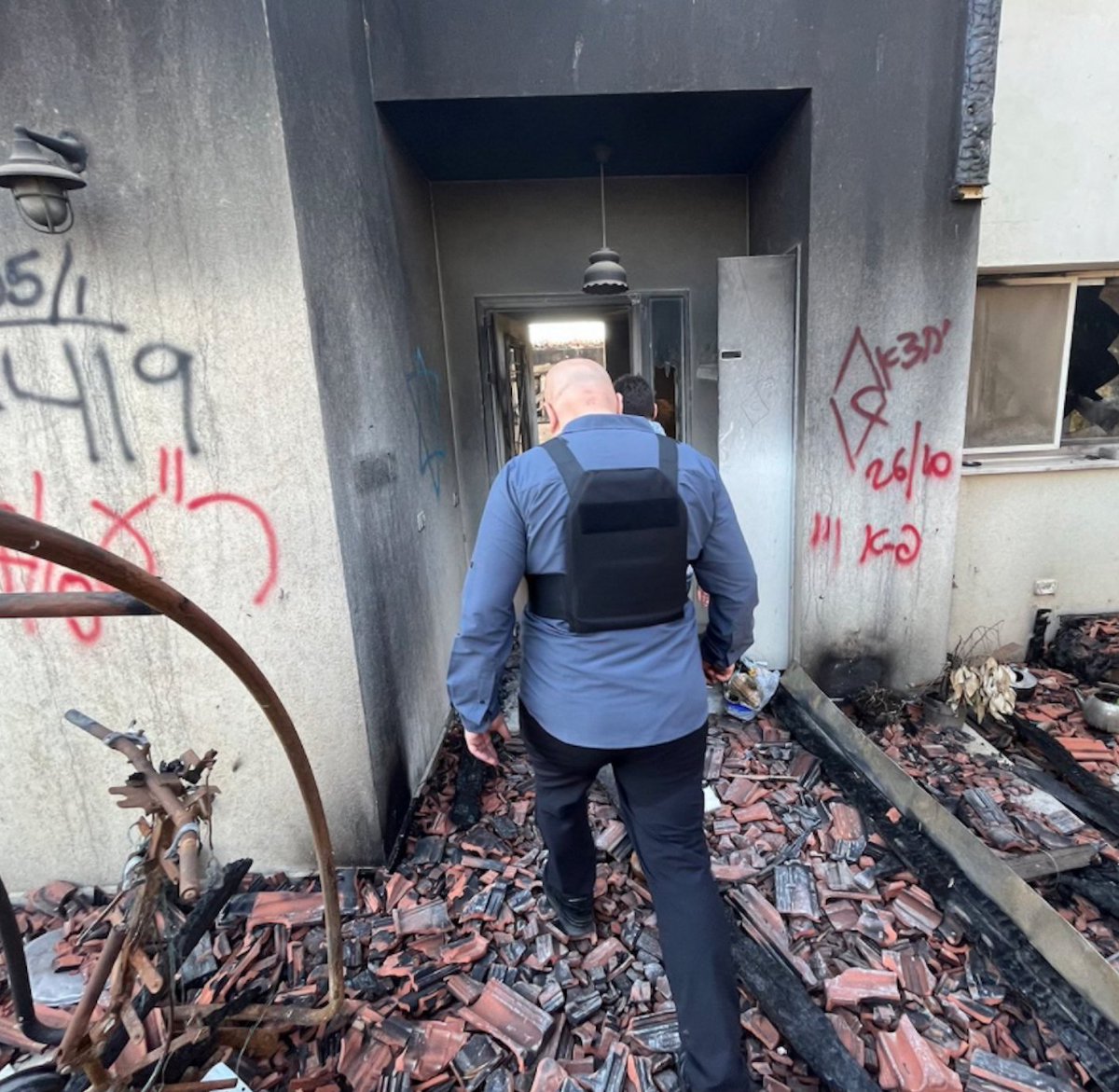
ICC Prosecutor Karim Khan visiting kibbutzim in Israel that were among the sites of the October 7 attack, December 2023. (ICC-CPI)
By the end of the third week of Israel’s bombardment of Gaza, which followed the Hamas-led assault on southern Israel, Khan was already on the ground at the Rafah Crossing. He subsequently made visits to both the West Bank and southern Israel in December, where he met with Palestinian officials as well as Israeli survivors of the October 7 attack and the relatives of people who had been killed.
Israeli intelligence closely followed Khan’s visit to try “to understand what materials the Palestinians were giving him,” as one Israeli source said. “Khan is the most boring man to gather intelligence about in the world, because he’s as straight as a ruler,” the source added.
In February, Khan issued a strongly-worded statement on X effectively urging Israel not to launch an assault on Rafah, where more than 1 million Palestinians were already seeking refuge. He also warned: “Those who do not comply with the law should not complain later when my office takes action.”
Just as with his predecessor, Israeli intelligence also surveilled Khan’s activities with Palestinians and other officials in his office. Surveillance of two Palestinians familiar with Khan’s intentions tipped off Israeli leaders to the fact that the prosecutor was considering an imminent request for arrest warrants for Israeli leaders, but was “under tremendous pressure from the United States” not to do so.
Eventually, on May 20, Khan followed through on his threat. He announced that he was seeking arrest warrants for Netanyahu and Gallant, after finding that there are reasonable grounds to believe that the two leaders bear responsibility for crimes including extermination, starvation, and deliberate attacks on civilians.
For the Palestinian human rights groups that Israel surveilled, Netanyahu and Gallant are just the tip of the iceberg. Three days before Khan’s announcement, the heads of Al-Haq, Al Mezan, and PCHR sent Khan a joint letter calling explicitly for arrest warrants against all members of Israel’s war cabinet, which includes Benny Gantz, as well as commanders and soldiers from the units currently involved in the Rafah offensive.
Khan now must also assess whether any Israelis behind operations aimed at undermining the ICC have committed offenses against the administration of justice. He warned in his May 20 announcement that his office “will not hesitate to act” against ongoing threats against the court and its investigation. Such offenses, for which Israeli leaders can be prosecuted regardless of the fact that Israel is not a signatory to the Rome Statute, could potentially carry a prison sentence.
An ICC spokesperson told the Guardian that it was aware of “proactive intelligence-gathering activities being undertaken by a number of national agencies hostile towards the court,” but stressed that “none of the recent attacks against it by national intelligence agencies” had penetrated the court’s core evidence holdings, which had remained secure. The spokesperson added that Khan’s office has been subjected to “several forms of threats and communications that could be viewed as attempts to unduly influence its activities.”
In response to a request for comment, the Israeli Prime Minister’s Office stated only that our report is “replete with many false and unfounded allegations meant to hurt the State of Israel.” The Israeli army also responded in brief: “Intelligence bodies in the IDF perform surveillance and other intelligence operations only against hostile elements and contrary to what is claimed, not against the ICC in The Hague or other international elements.”
CORRECTION: This article previously stated that Omar Awadallah and Ammar Hijazi work within the PA’s Justice Ministry; it has been corrected to show that they work within the Foreign Affairs Ministry.
Harry Davies and Bethan McKernan of the Guardian contributed to this report.
TRANSLATE
Pengawasan dan gangguan: Perang rahasia Israel di ICC terungkap
Pejabat tinggi pemerintah Israel dan pejabat keamanan telah mengawasi operasi pengawasan sembilan tahun yang menargetkan ICC dan kelompok hak Palestina untuk mencoba menggagalkan penyelidikan kejahatan perang, sebuah penyelidikan bersama mengungkapkan.
Oleh Yuval Abraham dan Meron Rapoport 28 Mei 2024
Jaksa ICC Karim Khan dilantik di kursi Pengadilan Kriminal Internasional, 16 Juni 2021. (ICC-CPI)
Jaksa ICC Karim Khan dilantik di kursi Pengadilan Kriminal Internasional, 16 Juni 2021. (ICC-CPI)
Selama hampir satu dekade, Israel telah mengawasi pejabat senior Pengadilan Kriminal Internasional dan pekerja hak asasi manusia Palestina sebagai bagian dari operasi rahasia untuk menggagalkan penyelidikan ICC terhadap dugaan kejahatan perang, sebuah penyelidikan bersama oleh Majalah +972, Panggilan Lokal, dan Guardian dapat mengungkapkan.
Operasi multi-badan, yang dimulai pada tahun 2015, telah melihat komunitas intelijen Israel secara rutin mengawasi kepala jaksa pengadilan saat ini Karim Khan, pendahulunya Fatou Bensouda, dan puluhan pejabat ICC dan PBB lainnya. Intelijen Israel juga memantau materi yang diserahkan Otoritas Palestina ke kantor kejaksaan, dan mengawasi karyawan di empat organisasi hak asasi manusia Palestina yang pengajuannya menjadi pusat penyelidikan.
Menurut sumber, operasi rahasia memobilisasi cabang tertinggi pemerintah Israel, komunitas intelijen, dan sistem hukum sipil dan militer untuk menggagalkan penyelidikan.
Informasi intelijen yang diperoleh melalui pengawasan diteruskan ke tim rahasia pengacara dan diplomat pemerintah Israel terkemuka, yang melakukan perjalanan ke Den Haag untuk pertemuan rahasia dengan pejabat ICC dalam upaya untuk "memberi makan [kepala jaksa] informasi yang akan membuatnya meragukan dasar haknya untuk menangani pertanyaan ini." Intelijen juga digunakan oleh militer Israel untuk secara retroaktif membuka penyelidikan terhadap insiden yang menarik bagi ICC, untuk mencoba membuktikan bahwa sistem hukum Israel mampu bertanggung jawab.
Selain itu, seperti yang dilaporkan Guardian sebelumnya hari ini, Mossad, badan intelijen asing Israel, menjalankan operasi paralelnya sendiri yang mencari informasi kompromi tentang Bensouda dan anggota keluarga dekatnya dalam upaya nyata untuk menyabotase penyelidikan ICC. Mantan kepala agensi, Yossi Cohen, secara pribadi berusaha untuk "mendaftarkan" Bensouda dan memanipulasinya untuk mematuhi keinginan Israel, menurut sumber yang akrab dengan aktivitasnya, menyebabkan jaksa saat itu takut akan keselamatan pribadinya.
Perdana Menteri Benjamin Netanyahu, terlihat bersama Yossi Cohen, kepala dewan keamanan nasional saat itu, pada konferensi pers di Kementerian Luar Negeri di Yerusalem, 15 Oktober 2015. (Miriam Alster/Flash90)
Perdana Menteri Benjamin Netanyahu, terlihat bersama Yossi Cohen, kepala dewan keamanan nasional saat itu, pada konferensi pers di Kementerian Luar Negeri di Yerusalem, 15 Oktober 2015. (Miriam Alster/Flash90)
Investigasi kami mengacu pada wawancara dengan lebih dari dua lusin petugas intelijen Israel saat ini dan mantan pejabat pemerintah, mantan pejabat ICC, diplomat, dan pengacara yang akrab dengan kasus ICC dan upaya Israel untuk melemahkannya. Menurut sumber-sumber ini, pada awalnya, operasi Israel berusaha untuk mencegah pengadilan membuka penyelidikan kriminal penuh; setelah penyelidikan penuh digerakkan pada tahun 2021, Israel berusaha untuk memastikan bahwa itu tidak akan membuahkan hasil.
Selain itu, menurut beberapa sumber, upaya licik Israel untuk mengganggu penyelidikan - yang dapat dianggap sebagai pelanggaran terhadap administrasi peradilan, yang dapat dihukum dengan hukuman penjara - telah dikelola dari atas. Perdana Menteri Benjamin Netanyahu dikatakan sangat tertarik dalam operasi tersebut, bahkan mengirim "instruksi" dan "bidang minat" kepada tim intelijen mengenai pemantauan mereka terhadap pejabat ICC. Satu sumber menekankan bahwa Netanyahu "terobsesi, terobsesi, terobsesi" dengan mencari tahu materi apa yang diterima ICC.
Perdana menteri memiliki alasan yang baik untuk dikhawatirkan: minggu lalu, Khan mengumumkan bahwa kantornya sedang mencari surat perintah penangkapan untuk Netanyahu dan Menteri Pertahanan Yoav Gallant, serta tiga pemimpin di sayap politik dan militer Hamas, sehubungan dengan dugaan kejahatan perang dan kejahatan terhadap kemanusiaan yang dilakukan pada atau sejak 7 Oktober. Pengumuman tersebut memperjelas bahwa surat perintah tambahan - yang mengekspos individu yang dituntut untuk ditangkap jika mereka mengunjungi salah satu dari 124 negara anggota ICC - mungkin belum dikejar.
Bagi petinggi Israel, pengumuman Khan tidak mengejutkan. Dalam beberapa bulan terakhir, kampanye pengawasan yang menargetkan kepala jaksa "mendaki ke puncak agenda," menurut satu sumber, sehingga memberikan pengetahuan lanjutan kepada pemerintah tentang niatnya.
Secara jelas, Khan mengeluarkan peringatan samar dalam pernyataannya: "Saya bersikeras bahwa semua upaya untuk menghalangi, mengintimidasi, atau secara tidak tepat mempengaruhi pejabat pengadilan ini harus segera dihentikan." Sekarang, kita dapat mengungkapkan rincian dari bagian dari apa yang dia peringatkan: "perang" sembilan tahun Israel di ICC.
'Para jenderal memiliki kepentingan pribadi yang besar dalam operasi'
Tidak seperti Mahkamah Internasional (ICJ), yang berurusan dengan legalitas tindakan negara - dan yang minggu lalu mengeluarkan keputusan yang dianggap meminta Israel untuk menghentikan serangannya di kota paling selatan Rafah di Gaza, dalam konteks petisi Afrika Selatan yang menuduh Israel melakukan genosida di Jalur Gaza - ICC berurusan dengan individu-individu tertentu yang dicurigai telah melakukan kejahatan perang.
Israel telah lama menyatakan bahwa ICC tidak memiliki yurisdiksi untuk mengadili para pemimpin Israel karena, seperti Amerika Serikat, Rusia, dan Cina, Israel bukan penandatangan Statuta Roma yang membentuk pengadilan, dan Palestina bukan negara anggota penuh PBB. Namun Palestina tetap diakui sebagai anggota ICC setelah menandatangani konvensi pada tahun 2015, setelah diterima di Majelis Umum PBB sebagai negara pengamat non-anggota tiga tahun sebelumnya.
Warga Palestina berkumpul untuk menonton pidato Presiden Mahmoud Abbas dalam upaya untuk status "negara pengamat non-anggota" Palestina di Perserikatan Bangsa-Bangsa, yang diproyeksikan di dinding pemisahan Israel di kota Tepi Barat Betlehem, 29 November 2012. (Ryan Rodrick Beiler/Activestills)
Warga Palestina berkumpul untuk menonton pidato Presiden Mahmoud Abbas dalam upaya untuk status "negara pengamat non-anggota" Palestina di Perserikatan Bangsa-Bangsa, yang diproyeksikan di dinding pemisahan Israel di kota Tepi Barat Betlehem, 29 November 2012. (Ryan Rodrick Beiler/Activestills)
Masuknya Palestina ke ICC dikutuk oleh para pemimpin Israel sebagai bentuk "terorisme diplomatik." "Itu dianggap sebagai penyeberangan garis merah, dan mungkin hal paling agresif yang pernah dilakukan Otoritas Palestina terhadap Israel di arena internasional," jelas seorang pejabat Israel. "Diakui sebagai negara di PBB itu bagus, tetapi ICC adalah mekanisme dengan gigi."
Segera setelah menjadi anggota pengadilan, PA meminta kantor kejaksaan untuk menyelidiki kejahatan yang dilakukan di Jalur Gaza dan Tepi Barat, termasuk Yerusalem Timur, mulai dari tanggal di mana Negara Palestina menerima yurisdiksi pengadilan: 13 Juli 2014. Fatou Bensouda, kepala jaksa pada saat itu, membuka pemeriksaan pendahuluan untuk menentukan apakah kriteria untuk penyelidikan penuh dapat dipenuhi.
Khawatir akan konsekuensi hukum dan politik dari penuntutan potensial, Israel berlomba untuk mempersiapkan tim intelijen di tentara, Shin Bet (intelijen domestik), dan Mossad (intelijen asing), bersama tim rahasia pengacara militer dan sipil, untuk memimpin upaya untuk mencegah penyelidikan ICC penuh. Semua ini dikoordinasikan di bawah Dewan Keamanan Nasional (NSC) Israel, yang wewenangnya berasal dari Kantor Perdana Menteri.
"Semua orang, seluruh pendirian militer dan politik, sedang mencari cara untuk merusak kasus PA," kata salah satu sumber intelijen. “Semua orang ikut serta: Kementerian Kehakiman, Departemen Hukum Internasional Militer [bagian dari Kantor Advokat Jenderal Militer], Shin Bet, NSC. [Semua orang] melihat ICC sebagai sesuatu yang sangat penting, sebagai perang yang harus dilancarkan, dan yang harus dipertahankan oleh Israel. Itu dijelaskan dalam istilah militer.”
Militer bukanlah kandidat yang jelas untuk bergabung dengan upaya pengumpulan intelijen Shin Bet, tetapi memiliki motivasi yang kuat: mencegah komandannya dipaksa untuk diadili. "Orang-orang yang benar-benar ingin [bergabung dengan upaya] adalah para jenderal IDF sendiri - mereka memiliki kepentingan pribadi yang sangat besar," salah satu sumber menjelaskan. "Kami diberitahu bahwa petugas senior takut untuk menerima posisi di Tepi Barat karena mereka takut dituntut di Den Haag," kenang yang lain.
Menurut berbagai sumber, Kementerian Urusan Strategis Israel, yang tujuannya pada saat itu adalah untuk melawan "delegitimasi" Israel, terlibat dalam pengawasan organisasi hak asasi manusia Palestina yang menyerahkan laporan ke ICC. Gilad Erdan, kepala kementerian pada saat itu dan sekarang perwakilan Israel untuk PBB, baru-baru ini menggambarkan pengejaran ICC terhadap surat perintah penangkapan untuk para pemimpin Israel sebagai "perburuan penyihir yang didorong oleh kebencian Yahudi murni."
Upacara untuk Kepala Staf yang akan datang, Herzi Halevi di pangkalan HaKirya di Tel Aviv, 16 Januari 2023. (Tomer Neuberg/Flash90)
Upacara untuk Kepala Staf yang akan datang, Herzi Halevi di pangkalan HaKirya di Tel Aviv, 16 Januari 2023. (Tomer Neuberg/Flash90)
'Tentara menangani hal-hal yang sepenuhnya non-militer'
Perang rahasia Israel terhadap ICC telah bergantung secara terpusat pada pengawasan, dan kepala jaksa telah menjadi target utama.
Empat sumber mengkonfirmasi pertukaran pribadi Bensouda dengan pejabat Palestina tentang kasus PA di Den Haag secara rutin dipantau dan dibagikan secara luas dalam komunitas intelijen Israel. "Percakapan biasanya tentang kemajuan penuntutan: menyerahkan dokumen, kesaksian, atau berbicara tentang peristiwa yang terjadi - 'Apakah Anda melihat bagaimana Israel membantai orang Palestina pada demonstrasi terakhir?' - hal-hal seperti itu," salah satu sumber menjelaskan.
Mantan jaksa jauh dari satu-satunya target. Puluhan pejabat internasional lainnya yang terkait dengan penyelidikan juga diawasi. Salah satu sumber mengatakan ada papan tulis besar dengan nama-nama sekitar 60 orang yang berada di bawah pengawasan - setengah dari mereka adalah orang Palestina dan setengah dari negara lain, termasuk pejabat PBB dan personel ICC di Den Haag.
Sumber lain mengingat pengawasan terhadap orang yang menulis laporan ICC tentang perang Gaza 2014 Israel. Sumber ketiga mengatakan intelijen Israel memantau komisi penyelidikan Dewan Hak Asasi Manusia PBB ke wilayah pendudukan, untuk mengidentifikasi materi apa yang diterimanya dari Palestina, "karena temuan komisi penyelidikan semacam ini biasanya digunakan oleh ICC."
Di Den Haag, Bensouda dan staf seniornya diperingatkan oleh penasihat keamanan dan melalui saluran diplomatik bahwa Israel sedang memantau pekerjaan mereka. Berhati-hatilah untuk tidak membahas hal-hal tertentu di sekitar telepon. "Kami diberitahu bahwa mereka mencoba untuk mendapatkan informasi tentang di mana kami berada dengan pemeriksaan pendahuluan," kata seorang mantan pejabat senior ICC.
Menurut sumber, beberapa orang di tentara Israel merasa kontroversial bahwa intelijen militer berurusan dengan hal-hal yang bersifat politik dan tidak terkait langsung dengan ancaman keamanan. "Sumber daya IDF digunakan untuk mengawasi Fatou Bensouda - ini bukan sesuatu yang sah untuk dilakukan sebagai intelijen militer," kata satu sumber. "Tugas ini [adalah] benar-benar tidak biasa dalam arti bahwa itu ada di dalam tentara, tetapi berurusan dengan hal-hal yang sepenuhnya non-militer," kata sumber lain.
Tetapi yang lain memiliki lebih sedikit keraguan. "Bensouda sangat, sangat sepihak," salah satu sumber yang mengawasi mantan jaksa mengklaim. “Dia benar-benar teman pribadi orang Palestina. Jaksa penuntut umum biasanya tidak berperilaku seperti itu. Mereka tetap sangat jauh.”
Pembukaan Resmi Tempat Permanen Pengadilan Kriminal Internasional, 19 April 2016. (Foto PBB/Rick Bajornas)
Pembukaan Resmi Tempat Permanen Pengadilan Kriminal Internasional, 19 April 2016. (Foto PBB/Rick Bajornas)
'Jika Anda tidak ingin saya menggunakan hukum, apa yang Anda ingin saya gunakan?'
Karena kelompok hak asasi manusia Palestina sering menyediakan kantor kejaksaan dengan materi tentang serangan Israel terhadap Palestina, merinci insiden yang mereka ingin jaksa pertimbangkan sebagai bagian dari penyelidikan, organisasi-organisasi ini sendiri menjadi target utama operasi pengawasan Israel. Di sini, Shin Bet memimpin.
Selain memantau materi yang diserahkan PA ke ICC, intelijen Israel juga memantau seruan dan laporan dari kelompok hak asasi manusia yang mencakup kesaksian warga Palestina yang telah menderita serangan oleh pemukim dan tentara Israel; Israel kemudian mengawasi para saksi ini juga.
"Salah satu [prioritas] adalah untuk melihat siapa [dalam kelompok hak asasi manusia] yang terlibat dalam mengumpulkan kesaksian, dan siapa orang-orang tertentu - korban Palestina - yang diyakinkan untuk memberikan kesaksian kepada ICC," salah satu sumber intelijen menjelaskan.
Menurut sumber, target pengawasan utama adalah empat organisasi hak asasi manusia Palestina: Al-Haq, Addameer, Al Mezan, dan Pusat Hak Asasi Manusia Palestina (PCHR). Addameer mengirim banding ke ICC tentang praktik penyiksaan terhadap tahanan dan tahanan, sementara tiga kelompok lainnya mengirim beberapa banding selama bertahun-tahun mengenai perusahaan pemukiman Israel di Tepi Barat, pembongkaran rumah hukuman, kampanye pemboman di Gaza, dan pemimpin politik dan militer senior Israel tertentu.
Satu sumber intelijen mengatakan motif untuk mengawasi organisasi-organisasi tersebut dinyatakan secara terbuka: mereka merusak posisi Israel di arena internasional. "Kami diberitahu bahwa ini adalah organisasi yang beroperasi di arena internasional, berpartisipasi dalam BDS, dan ingin membahayakan Israel secara legal, jadi mereka juga sedang dipantau," kata sumber itu. “Itulah mengapa kami terlibat dengan ini. Karena itu dapat menyakiti orang-orang di Israel — petugas, politisi.”
Tujuan lain dari pengawasan kelompok-kelompok Palestina adalah untuk mencoba mendelegitimasi mereka, dan, dengan perluasan, seluruh penyelidikan ICC.
Pada Oktober 2021, Menteri Pertahanan Israel Benny Gantz - yang namanya sendiri disebutkan dalam beberapa permohonan yang dikirim organisasi Palestina ke ICC, karena perannya sebagai kepala staf selama perang Gaza 2014 dan menteri pertahanan selama perang Mei 2021 - menyatakan Al-Haq, Addameer, dan empat kelompok hak asasi manusia Palestina lainnya sebagai "organisasi teroris."
Benny Gantz, menteri kabinet perang dan kepala Partai Persatuan Nasional, mengadakan konferensi pers di Ramat Gan, 18 Mei 2024. (Miriam Alster/Flash90)
Benny Gantz, menteri kabinet perang dan kepala Partai Persatuan Nasional, mengadakan konferensi pers di Ramat Gan, 18 Mei 2024. (Miriam Alster/Flash90)
Investigasi +972 dan Local Call, dirilis beberapa minggu kemudian, menemukan bahwa perintah Gantz dikeluarkan tanpa bukti serius untuk mendukung tuduhannya; berkas Shin Bet yang mengklaim memberikan bukti tuduhannya, dan berkas tindak lanjut lainnya beberapa bulan kemudian, bahkan membuat sekutu Israel yang paling setia pun tidak yakin. Pada saat itu, secara luas berspekulasi - termasuk oleh organisasi itu sendiri - bahwa kelompok-kelompok ini ditargetkan setidaknya sebagian karena aktivitas mereka yang berkaitan dengan penyelidikan ICC.
Menurut sumber intelijen, Shin Bet - yang memberikan rekomendasi awal untuk melarang enam kelompok - mengawasi karyawan organisasi, dan informasi yang dikumpulkan digunakan oleh Gantz ketika dia menyatakan mereka sebagai organisasi teroris. Investigasi oleh Citizen Lab pada saat itu mengidentifikasi spyware Pegasus, yang diproduksi oleh perusahaan Israel NSO Group, di ponsel beberapa orang Palestina yang bekerja di LSM tersebut. (Shin Bet tidak menanggapi permintaan komentar kami.)
Omar Awadallah dan Ammar Hijazi, yang bertanggung jawab atas kasus ICC di Kementerian Luar Negeri PA, juga menemukan bahwa Pegasus telah dipasang di ponsel mereka. Menurut sumber intelijen, keduanya secara bersamaan menjadi target organisasi intelijen Israel yang berbeda, yang menciptakan "kebingungan." "Mereka berdua adalah PhD yang sangat mengesankan yang menangani subjek ini sepanjang hari, dari pagi hingga malam - itulah mengapa ada kecerdasan yang dapat diperoleh [dari melacak mereka]," kata salah satu sumber.
Hijazi tidak terkejut bahwa dia diawasi. "Kami tidak peduli jika Israel melihat bukti yang kami serahkan ke pengadilan," katanya. "Saya mengundang mereka: Datang, buka mata Anda, lihat apa yang kami sajikan."
Shawan Jabarin, direktur jenderal Al-Haq, juga diawasi oleh intelijen Israel. Dia mengatakan ada indikasi bahwa sistem internal organisasi telah diretas, dan bahwa deklarasi Gantz datang hanya beberapa hari sebelum Al-Haq berencana untuk mengungkapkan bahwa mereka telah menemukan spyware Pegasus di ponsel karyawannya. "Mereka mengatakan saya menggunakan hukum sebagai senjata perang," kata Jabarin. "Jika Anda tidak ingin saya menggunakan hukum, apa yang Anda ingin saya gunakan, bom?"
Namun, kelompok hak asasi manusia menyatakan keprihatinan mendalam terhadap privasi warga Palestina yang mengajukan kesaksian ke pengadilan. Salah satu kelompok, misalnya, hanya memasukkan inisial para saksi dalam pengajuannya ke ICC, karena takut bahwa Israel mungkin mengidentifikasi mereka.
"Orang-orang takut untuk mengajukan keluhan [ke ICC], atau menyebutkan nama asli mereka, karena mereka takut dianiaya oleh militer, kehilangan izin masuk mereka," Hamdi Shakura, seorang pengacara di PCHR, menjelaskan. "Seorang pria di Gaza yang memiliki kerabat yang sakit kanker takut tentara akan mengambil izin masuknya dan mencegah perawatannya - hal semacam ini terjadi."
Kepala LSM Palestina berbicara kepada media di luar kantor Al-Haq setelah tentara Israel menggerebek kantor mereka, Ramallah, Tepi Barat, 18 Agustus 2022. (Oren Ziv)
Kepala LSM Palestina berbicara kepada media di luar kantor Al-Haq setelah tentara Israel menggerebek kantor mereka, Ramallah, Tepi Barat, 18 Agustus 2022. (Oren Ziv)
'Para pengacara sangat haus akan kecerdasan'
Menurut sumber intelijen, penggunaan lebih lanjut dari intelijen yang diperoleh melalui pengawasan adalah untuk membantu pengacara yang terlibat dalam percakapan saluran belakang rahasia dengan perwakilan kantor kejaksaan di Den Haag.
Segera setelah Bensouda mengumumkan bahwa kantornya membuka pemeriksaan pendahuluan, Netanyahu memerintahkan pembentukan tim pengacara rahasia dari Kementerian Kehakiman, Kementerian Luar Negeri, dan Kantor Advokat Jenderal Militer (otoritas hukum tertinggi tentara Israel), yang secara teratur melakukan perjalanan ke Den Haag untuk pertemuan rahasia dengan pejabat ICC antara tahun 2017 dan 2019. (Kementerian Kehakiman Israel tidak menanggapi permintaan komentar.)
Meskipun tim terdiri dari individu-individu yang bukan bagian dari komunitas intelijen Israel - itu dipimpin oleh Tal Becker, penasihat hukum untuk Kementerian Luar Negeri - Kementerian Kehakiman tetap mengetahui intelijen yang diperoleh melalui pengawasan, dan memiliki akses ke laporan dari PA dan LSM Palestina yang merinci kasus-kasus spesifik pemukim dan kekerasan militer.
"Para pengacara yang menangani masalah ini di Kementerian Kehakiman sangat haus akan intelijen," kata salah satu sumber intelijen. “Mereka mendapatkannya dari intelijen militer dan Shin Bet. Mereka sedang membangun kasus untuk utusan Israel yang diam-diam pergi dan berkomunikasi dengan ICC.”
Dalam pertemuan pribadi mereka dengan pejabat ICC, yang dikonfirmasi oleh enam sumber yang akrab dengan pertemuan tersebut, para pengacara berangkat untuk membuktikan bahwa Israel memiliki prosedur yang kuat dan efektif untuk meminta pertanggungjawaban tentara, terlepas dari catatan mengerikan militer Israel dalam menyelidiki dugaan kesalahan dalam jajarannya. Para pengacara juga berusaha untuk membuat kasus bahwa ICC tidak memiliki yurisdiksi untuk menyelidiki tindakan Israel, karena Israel bukan negara anggota pengadilan dan Palestina bukan anggota penuh PBB.
Menurut mantan pejabat ICC yang akrab dengan isi pertemuan, personel ICC mempresentasikan kepada pengacara Israel rincian insiden di mana warga Palestina diserang atau dibunuh, dan pengacara akan merespons dengan informasi mereka sendiri. "Pada awalnya itu tegang," kenang sang pejabat.
Pada tahap ini, Bensouda masih terlibat dalam pemeriksaan awal sebelum keputusan untuk membuka penyelidikan formal. Sebuah sumber intelijen mengatakan bahwa tujuan dari informasi yang diperoleh melalui pengawasan adalah "untuk membuat Bensouda merasa bahwa data hukumnya tidak dapat diandalkan."
Jaksa ICC Fatou Bensouda bertemu dengan Menteri Luar Negeri Palestina Riyad al-Maliki di sela-sela sesi ke-18 ASP, 2 Desember 2019. (ICC-CPI)
Jaksa ICC Fatou Bensouda bertemu dengan Menteri Luar Negeri Palestina Riyad al-Maliki di sela-sela sesi ke-18 ASP, 2 Desember 2019. (ICC-CPI)
Menurut sumber, tujuannya adalah untuk "memberi [Bensouda] informasi yang akan membuatnya meragukan dasar haknya untuk menangani pertanyaan ini. Ketika Al-Haq mengumpulkan informasi tentang berapa banyak orang Palestina yang telah terbunuh di wilayah pendudukan pada tahun lalu dan menyampaikannya kepada Bensouda, itu adalah kepentingan dan kebijakan Israel untuk menyampaikan kontraintelnya, dan untuk mencoba merusak informasi ini.”
Mengingat bahwa Israel menolak untuk mengakui otoritas dan legitimasi pengadilan, bagaimanapun, sangat penting bagi delegasi bahwa pertemuan-pertemuan ini dirahasiakan. Sebuah sumber yang akrab dengan pertemuan tersebut mengatakan para pejabat Israel berulang kali menekankan kepada ICC bahwa "kami tidak akan pernah bisa mempublikasikan bahwa kami berkomunikasi dengan Anda."
Pertemuan saluran belakang Israel dengan ICC berakhir pada Desember 2019, ketika pemeriksaan awal lima tahun Bensouda menyimpulkan bahwa ada dasar yang masuk akal untuk percaya bahwa baik Israel maupun Hamas telah melakukan kejahatan perang. Daripada segera meluncurkan penyelidikan penuh, bagaimanapun, jaksa meminta hakim pengadilan untuk memutuskan apakah ia memiliki yurisdiksi untuk mendengar tuduhan karena "masalah hukum dan faktual yang unik dan sangat diperebutkan" - yang oleh beberapa orang dipandang sebagai hasil langsung dari aktivitas Israel.
"Saya tidak akan mengatakan bahwa argumen hukum tidak berpengaruh," Roy Schondorf, anggota delegasi Israel sebagai kepala departemen Kementerian Kehakiman yang bertanggung jawab untuk menangani proses hukum internasional terhadap Israel, mengatakan pada sebuah acara di Institut Studi Keamanan Nasional pada Juli 2022. "Ada juga orang-orang di sana yang dapat dibujuk, dan saya pikir untuk sebagian besar, Negara Israel berhasil meyakinkan setidaknya jaksa sebelumnya [Bensouda], bahwa akan ada cukup keraguan tentang pertanyaan yurisdiksi baginya untuk beralih ke hakim pengadilan."
'Klaim saling melengkapi sangat, sangat signifikan'
Pada tahun 2021, hakim pengadilan memutuskan bahwa ICC memiliki yurisdiksi atas semua kejahatan perang yang dilakukan oleh Israel dan Palestina di wilayah Palestina yang diduduki, serta kejahatan yang dilakukan oleh warga Palestina di wilayah Israel. Terlepas dari enam tahun upaya Israel untuk mencegahnya, Bensouda mengumumkan pembukaan penyelidikan kriminal formal.
Tapi itu jauh dari kesimpulan yang sudah pasti. Beberapa bulan sebelumnya, jaksa telah memutuskan untuk membatalkan pemeriksaan terhadap kejahatan perang Inggris di Irak karena dia yakin bahwa Inggris telah mengambil tindakan "asli" untuk menyelidikinya. Menurut ahli hukum senior Israel, Israel berpegang teguh pada preseden ini, dan memulai kolaborasi erat antara operasi pengumpulan intelijen dan sistem peradilan militer.
Menurut sumber, tujuan utama operasi pengawasan Israel adalah untuk memungkinkan militer untuk "membuka penyelidikan secara surut" terhadap kasus-kasus kekerasan terhadap warga Palestina yang mencapai kantor kejaksaan di Den Haag. Dengan demikian, Israel bertujuan untuk mengeksploitasi "prinsip saling melengkapi," yang menegaskan bahwa suatu kasus tidak dapat diterima di hadapan ICC jika sudah diselidiki secara menyeluruh oleh negara dengan yurisdiksi atas kasus tersebut.
Warga Palestina kembali untuk memeriksa rumah mereka di Khan Younis setelah tentara Israel mundur dari daerah tersebut, Jalur Gaza selatan, 8 April 2024. (Atia Mohammed/Flash90)
Warga Palestina kembali untuk memeriksa rumah mereka di Khan Younis setelah tentara Israel mundur dari daerah tersebut, Jalur Gaza selatan, 8 April 2024. (Atia Mohammed/Flash90)
"Jika materi dipindahkan ke ICC, itu harus dipahami dengan tepat apa itu, untuk memastikan bahwa IDF menyelidikinya secara independen dan memadai sehingga mereka dapat mengklaim saling melengkapi," salah satu sumber menjelaskan. "Klaim saling melengkapi sangat, sangat signifikan."
Pakar hukum dalam Mekanisme Penilaian Pencarian Fakta Kepala Staf Gabungan (FFAM) - badan militer yang menyelidiki dugaan kejahatan perang oleh tentara Israel - juga mengetahui informasi intelijen, kata sumber.
Di antara lusinan insiden yang saat ini sedang diselidiki oleh FFAM adalah pemboman yang menewaskan puluhan orang Palestina di kamp pengungsi Jabaliya Oktober lalu; "pembantaian tepung" di mana lebih dari 110 orang Palestina tewas di Gaza utara setelah kedatangan konvoi bantuan pada bulan Maret; serangan drone yang menewaskan tujuh karyawan World Central Kitchen pada bulan April; dan serangan udara di perkemahan tenda di Rafah yang memicu kebakaran dan menewaskan puluhan minggu lalu.
Namun, bagi LSM Palestina yang mengajukan laporan ke ICC, mekanisme akuntabilitas militer internal Israel adalah lelucon. Digaungkan oleh para ahli Israel dan internasional dan kelompok hak asasi manusia, warga Palestina telah lama berargumen bahwa sistem ini - dari penyelidik polisi dan tentara hingga Mahkamah Agung - secara rutin berfungsi sebagai "daun ara" bagi negara Israel dan aparat keamanannya, membantu "memutihi" kejahatan sambil secara efektif memberikan lisensi kepada tentara dan komandan untuk melanjutkan tindakan kriminal dengan impunitas.
Issam Younis, yang menjadi sasaran pengawasan Israel karena perannya sebagai direktur Al Mezan, menghabiskan sebagian besar karirnya di Gaza, di kantor organisasi yang sekarang sebagian dibom, mengumpulkan dan mengajukan "ratusan" keluhan dari warga Palestina ke Kantor Advokat Jenderal Militer Israel. Sebagian besar keluhan ini ditutup tanpa dakwaan, meyakinkannya bahwa "korban tidak dapat mengejar keadilan melalui sistem itu."
Inilah yang menyebabkan organisasinya terlibat dengan ICC. "Dalam perang ini, sifat dan ruang lingkup kejahatan yang dilakukan belum pernah terjadi sebelumnya," kata Younis, yang melarikan diri dari Gaza bersama keluarganya pada bulan Desember, dan saat ini menjadi pengungsi di Kairo. "Dan itu hanya karena akuntabilitas tidak ada di sana."
'7 Oktober mengubah kenyataan itu'
Pada bulan Juni 2021, Khan menggantikan Bensouda sebagai kepala jaksa, dan banyak orang di sistem peradilan Israel berharap ini akan berubah menjadi hal baru. Khan dianggap lebih berhati-hati daripada pendahulunya, dan ada spekulasi bahwa dia akan memilih untuk tidak memprioritaskan penyelidikan eksplosif yang dia warisi dari Bensouda.
Dalam sebuah wawancara pada September 2022, di mana dia juga mengungkapkan beberapa detail tentang "dialog informal" Israel dengan ICC, Schondorf dari Kementerian Kehakiman Israel memuji Khan karena telah "menggeser lintasan kapal," menambahkan bahwa tampaknya jaksa akan fokus pada lebih banyak "masalah arus utama" karena "konflik Israel-Palestina menjadi masalah yang kurang mendesak bagi komunitas internasional."
Sementara itu, penilaian pribadi Khan menjadi target penelitian utama dari operasi pengawasan Israel: tujuannya adalah untuk "memahami apa yang dipikirkan Khan," seperti yang dikatakan oleh salah satu sumber intelijen. Dan sementara pada awalnya tim jaksa tampaknya tidak menunjukkan banyak antusiasme untuk kasus Palestina, menurut seorang pejabat senior Israel, "7 Oktober mengubah kenyataan itu."
Jaksa ICC Karim Khan mengunjungi kibbutzim di Israel yang merupakan salah satu lokasi serangan 7 Oktober, Desember 2023. (ICC-CPI)
Jaksa ICC Karim Khan mengunjungi kibbutzim di Israel yang merupakan salah satu lokasi serangan 7 Oktober, Desember 2023. (ICC-CPI)
Pada akhir minggu ketiga pemboman Israel di Gaza, yang mengikuti serangan yang dipimpin Hamas di Israel selatan, Khan sudah berada di lapangan di Penyeberangan Rafah. Dia kemudian melakukan kunjungan ke Tepi Barat dan Israel selatan pada bulan Desember, di mana dia bertemu dengan pejabat Palestina serta korban Israel yang selamat dari serangan 7 Oktober dan kerabat orang-orang yang telah terbunuh.
Intelijen Israel mengikuti dengan cermat kunjungan Khan untuk mencoba "memahami materi apa yang diberikan Palestina kepadanya," kata salah satu sumber Israel. "Khan adalah orang yang paling membosankan untuk mengumpulkan intelijen di dunia, karena dia lurus seperti penguasa," tambah sumber itu.
Pada bulan Februari, Khan mengeluarkan pernyataan dengan kata-kata kuat tentang X yang secara efektif mendesak Israel untuk tidak melancarkan serangan terhadap Rafah, di mana lebih dari 1 juta orang Palestina sudah mencari perlindungan. Dia juga memperingatkan: "Mereka yang tidak mematuhi hukum seharusnya tidak mengeluh nanti ketika kantor saya mengambil tindakan."
Sama seperti pendahulunya, intelijen Israel juga mengawasi aktivitas Khan dengan warga Palestina dan pejabat lainnya di kantornya. Pengawasan terhadap dua orang Palestina yang akrab dengan niat Khan memberi tahu para pemimpin Israel fakta bahwa jaksa sedang mempertimbangkan permintaan yang akan segera untuk surat perintah penangkapan bagi para pemimpin Israel, tetapi "di bawah tekanan luar biasa dari Amerika Serikat" untuk tidak melakukannya.
Akhirnya, pada tanggal 20 Mei, Khan menindaklanjuti ancamannya. Dia mengumumkan bahwa dia sedang mencari surat perintah penangkapan untuk Netanyahu dan Gallant, setelah menemukan bahwa ada alasan yang masuk akal untuk percaya bahwa kedua pemimpin bertanggung jawab atas kejahatan termasuk pemusnahan, kelaparan, dan serangan yang disengaja terhadap warga sipil.
Bagi kelompok hak asasi manusia Palestina yang diawasi Israel, Netanyahu dan Gallant hanyalah puncak gunung es. Tiga hari sebelum pengumuman Khan, kepala Al-Haq, Al Mezan, dan PCHR mengirim surat bersama kepada Khan yang menyerukan secara eksplisit surat perintah penangkapan terhadap semua anggota kabinet perang Israel, yang mencakup Benny Gantz, serta komandan dan tentara dari unit yang saat ini terlibat dalam serangan Rafah.
Khan sekarang juga harus menilai apakah ada orang Israel di balik operasi yang bertujuan untuk melemahkan ICC telah melakukan pelanggaran terhadap administrasi peradilan. Dia memperingatkan dalam pengumumannya pada 20 Mei bahwa kantornya "tidak akan ragu untuk bertindak" terhadap ancaman yang sedang berlangsung terhadap pengadilan dan penyelidikannya. Pelanggaran semacam itu, di mana para pemimpin Israel dapat dituntut terlepas dari fakta bahwa Israel bukan penandatangan Statuta Roma, berpotensi membawa hukuman penjara.
Paling banyak dibaca di +972
Seorang juru bicara ICC mengatakan kepada Guardian bahwa mereka menyadari "kegiatan pengumpulan intelijen proaktif yang dilakukan oleh sejumlah lembaga nasional yang memusuhi pengadilan," tetapi menekankan bahwa "tidak ada serangan baru-baru ini terhadapnya oleh lembaga intelijen nasional" yang telah menembus kepemilikan bukti inti pengadilan, yang tetap aman. Juru bicara itu menambahkan bahwa kantor Khan telah menjadi sasaran "beberapa bentuk ancaman dan komunikasi yang dapat dilihat sebagai upaya untuk secara tidak semestinya mempengaruhi aktivitasnya."
Menanggapi permintaan komentar, Kantor Perdana Menteri Israel hanya menyatakan bahwa laporan kami "penuh dengan banyak tuduhan palsu dan tidak berdasar yang dimaksudkan untuk menyakiti Negara Israel." Tentara Israel juga menanggapi secara singkat: "Badan intelijen di IDF melakukan pengawasan dan operasi intelijen lainnya hanya terhadap elemen yang bermusuhan dan bertentangan dengan apa yang diklaim, bukan terhadap ICC di Den Haag atau elemen internasional lainnya."
KOREKSI: Artikel ini sebelumnya menyatakan bahwa Omar Awadallah dan Ammar Hijazi bekerja di dalam Kementerian Kehakiman PA; itu telah dikoreksi untuk menunjukkan bahwa mereka bekerja di dalam Kementerian Luar Negeri.
Harry Davies dan Bethan McKernan dari Guardian berkontribusi pada laporan ini.


No comments:
Post a Comment